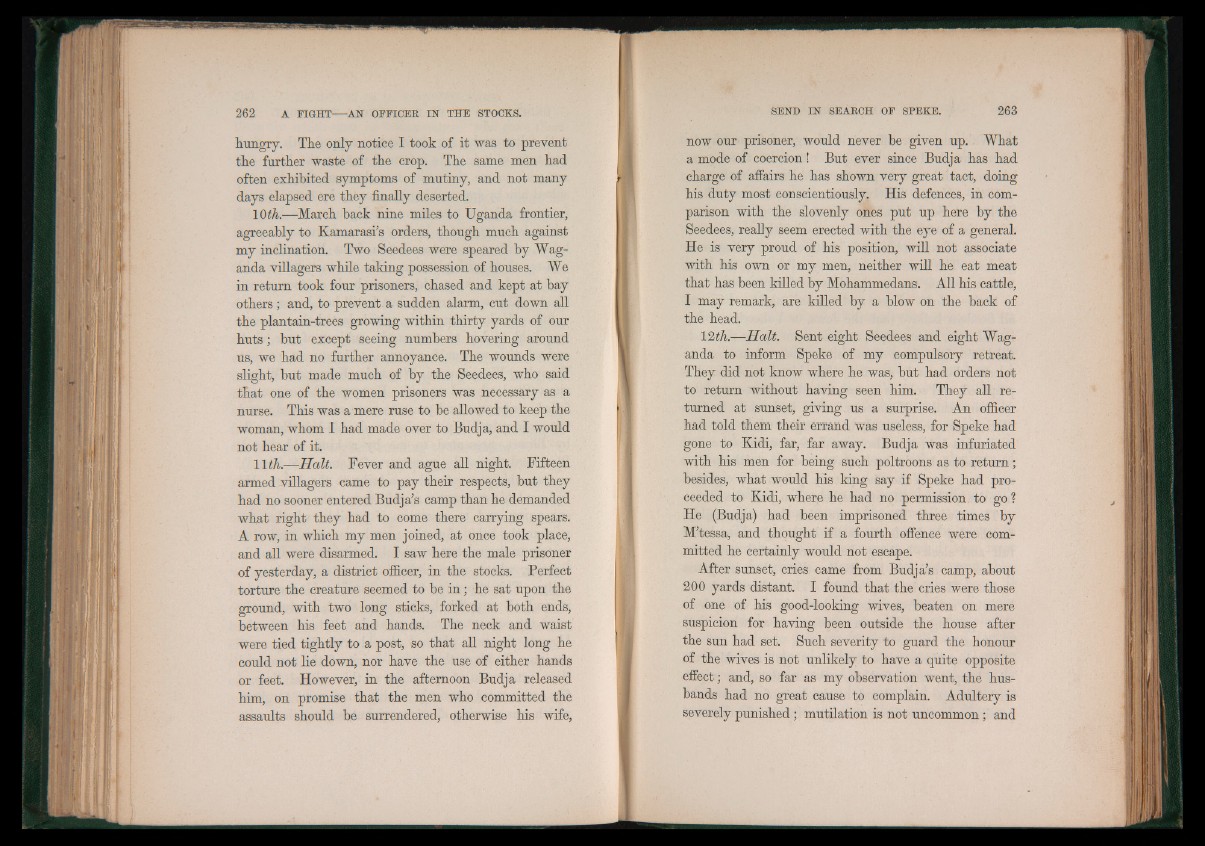
hungry. The only notice I took of it was to prevent
the further waste of the crop. The same men had
often exhibited symptoms of mutiny, and not many
days elapsed ere they finally deserted.
1 Oth.—March back nine miles to Uganda frontier,
agreeably to Kamarasi’s orders, though much against
my inclination. Two Seedees were speared by Wag-
anda villagers while taking possession of houses. We
in return took four prisoners, chased and kept at bay
others; and, to prevent a sudden alarm, cut down all
the plantain-trees growing within thirty yards of our
h u ts; but except seeing numbers hovering around
us, we had no further annoyance. The wounds were
slight, but made much of by the Seedees, who said
that one of the women prisoners was necessary as a
nurse. This was a mere ruse to be allowed to keep the
woman, whom I had made over to Budja, and I would
not hear of it.
11th.—Halt. Fever and ague all night. Fifteen
armed villagers came to pay their respects, but they
had no sooner entered Budja’s camp than he demanded
what right they had to come there carrying spears.
A row, in which my men joined, at once took place,
and all were disarmed. I saw here the male prisoner
of yesterday, a district officer, in the stocks. Perfect
torture the creature seemed to be in ; he sat upon the
ground, with two long sticks, forked at both ends,
between his feet and hands. The neck and waist
were tied tightly to a post, so that all night long he
could not lie down, nor have the use of either hands
or feet. However, in the afternoon Budja released
him, on promise that the men who committed the
assaults should be surrendered, otherwise his wife,
now our prisoner, would never be given up. What
a mode of coercion! But ever since Budja has had
charge of affairs he has shown very great tact, doing
his duty most conscientiously. His defences, in comparison
with the slovenly ones put up here by the
Seedees, really seem erected with the eye of a general.
He is very proud of his position, will not associate
with his own or my men, neither will he eat meat
that has been killed by Mohammedans. All his cattle,
I may remark, are killed by a blow on the back of
the head.
12th.—Halt. Sent eight Seedees and eight Wag-
anda to inform Speke of my compulsory retreat.
They did not know where he was, but had orders not
to return without having seen him. They all returned
at sunset, giving us a surprise. An officer
had told them their errand was useless, for Speke had
gone to Kidi, far, far away. Budja was infuriated
with his men for being such poltroons as to return;
besides, what would his king say if Speke had proceeded
to Kidi, where he had no permission to go ?
He (Budja) had been imprisoned three times by
M’tessa, and thought if a fourth offence were committed
he certainly would not escape.
After sunset, cries came from Budja’s camp, about
200 yards distant. I found that the cries were those
of one of his good-looking wives, beaten on mere
suspicion for having been outside the house after
the sun had set. Such severity to guard the honour
of the wives is not unlikely to have a quite opposite
effect; and, so far as my observation went, the husbands
had no great cause to complain. Adultery is
severely punished; mutilation is not uncommon s’ and